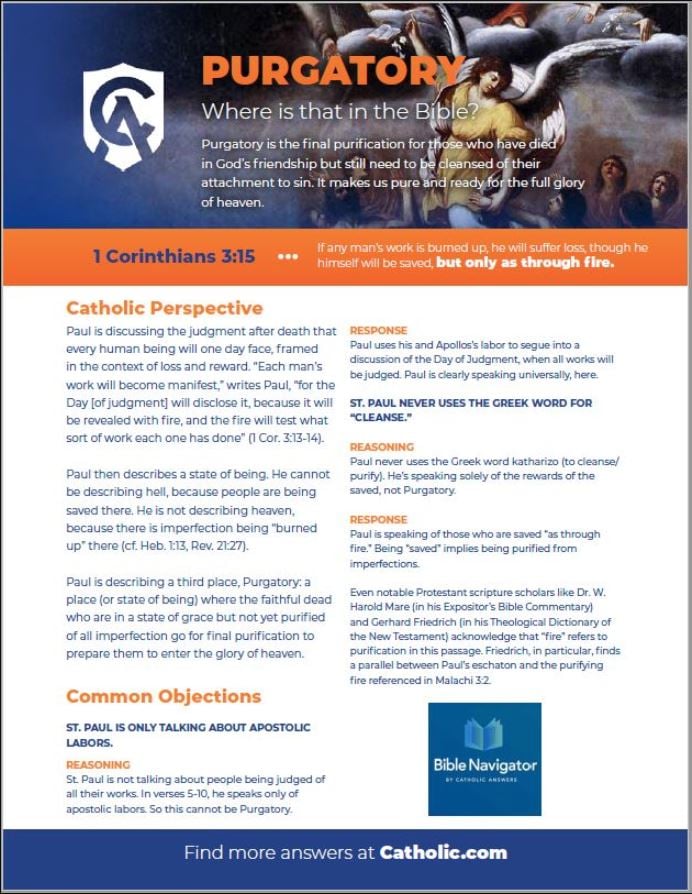
Catholic Teaching on Purgatory
The Catechism of the Catholic Church defines purgatory as a “purification, so as to achieve the holiness necessary to enter the joy of heaven,” which is experienced by those “who die in God’s grace and friendship, but still imperfectly purified” (CCC 1030). It notes that “this final purification of the elect . . . is entirely different from the punishment of the damned” (CCC 1031).
The purification is necessary because, as Scripture teaches, nothing unclean will enter the presence of God in heaven (Rev. 21:27) and, while we may die with our mortal sins forgiven, there can still be many impurities in us, specifically venial sins and the temporal punishment due to sins already forgiven.
What Happens in Purgatory?
When we die, we undergo what is called the particular, or individual, judgment. Scripture says that “it is appointed for men to die once, and after that comes judgment” (Heb. 9:27). We are judged instantly and receive our reward, for good or ill. We know at once what our final destiny will be. At the end of time, when Jesus returns, there will come the general judgment to which the Bible refers, for example, in Matthew 25:31-32: “When the Son of man comes in his glory, and all the angels with him, then he will sit on his glorious throne. Before him will be gathered all the nations, and he will separate them one from another as a shepherd separates the sheep from the goats.” In this general judgment all our sins will be publicly revealed (Luke 12:2–5).
Augustine said in The City of God that “temporary punishments are suffered by some in this life only, by others after death, by others both now and then; but all of them before that last and strictest judgment” (21:13). It is between the particular and general judgments, then, that the soul is purified of the remaining consequences of sin: “I tell you, you will never get out till you have paid the very last copper” (Luke 12:59).
The Catholic Church, Purgatory, and Indulgences
One argument anti-Catholics often use to attack purgatory is the idea that the Catholic Church owes the majority of its wealth to the doctrine of purgatory. But the numbers just don’t add up.
When a Catholic requests a memorial Mass for the dead—that is, a Mass said for the benefit of someone in purgatory—it is customary to give the parish priest a stipend, on the principles that the laborer is worth his hire (Luke 10:7) and that those who preside at the altar share the altar’s offerings (1 Cor. 9:13–14). In the United States, a stipend is commonly around five dollars; but the indigent do not have to pay anything. A few people, of course, freely offer more. This money goes to the parish priest, and priests are allowed to receive only one such stipend per day. No one gets rich on five dollars a day, and certainly not the Church, which does not receive the money anyway.
But look at what happens on a Sunday. There are often hundreds of people at Mass. In a crowded parish, there may be thousands. Many families and individuals deposit five dollars or more into the collection basket; a few give much more. A parish might have four or five or six Masses on a Sunday. The total from the Sunday collections far surpasses the paltry amount received from the memorial Masses.
Indulgences are often brought into this discussion as well. However, when properly understood, an indulgence is the remission of temporal punishment due to sins already forgiven. This can be either applied to oneself, or for a faithful departed. The Catholic Church encourages the faithful to gain indulgences through prayer and penance. Unfortunately, at times in history, indulgences were abused and many of the faithful were led to believe that money could purchase spiritual benefits, or less time in purgatory. However, this was a distortion. The Catholic Church has never taught that salvation can be merited by money or purchased through indulgences.
Is Purgatory a Catholic “Invention”?
Fundamentalists may be fond of saying the Catholic Church “invented” the doctrine of purgatory to make money, but they have difficulty saying just when. Most professional anti-Catholics—the ones who make their living attacking “Romanism”—seem to place the blame on Pope Gregory the Great, who reigned from A.D. 590 to 604.
But that hardly accounts for the request of Monica, mother of Augustine, who asked her son, in the fourth century, to remember her soul in his Masses. This would make no sense if she thought her soul would not benefit from prayers, as would be the case if she were in hell or in the full glory of heaven.
Nor does ascribing the doctrine to Gregory explain the graffiti in the catacombs, where Christians during the persecutions of the first three centuries recorded prayers for the dead. Indeed, some of the earliest Christian writings outside the New Testament, like the Acts of Paul and Thecla and the Martyrdom of Perpetua and Felicity (both written during the second century), refer to the Christian practice of praying for the dead. Such prayers would have been offered only if Christians believed in purgatory, even if they did not use that name for it. (See Catholic Answers’ tract The Roots of Purgatory for quotations from these and other early Christian sources.)
Why No Protests?
A study of the history of doctrines indicates that Christians in the first centuries were up in arms if anyone suggested the least change in beliefs. They were extremely conservative people who tested a doctrine’s truth by asking, “was this believed by our ancestors? Was it handed on from the apostles?” Surely belief in purgatory would be considered a great change, if it had not been believed from the first—so where are the records of protests?
They don’t exist. There is no hint at all, in the oldest writings available to us (or in later ones, for that matter), that “true believers” in the immediate post-apostolic years spoke of purgatory as a novel doctrine. They must have understood that the oral teaching of the apostles, what Catholics call tradition, and the Bible not only failed to contradict the doctrine, but, in fact, confirmed it.
Purgatory vs. Limbo
It is no wonder, then, that those who deny the existence of purgatory tend to touch upon only briefly the history of the belief. They prefer to claim that the Bible speaks only of heaven and hell. Wrong. It speaks plainly of a third condition, commonly called the limbo of the Fathers, where the just who had died before the redemption were waiting for heaven to be opened to them. After his death and before his resurrection, Christ visited those experiencing the limbo of the Fathers and preached to them the good news that heaven would now be opened to them (1 Pet. 3:19). These people thus were not in heaven, but neither were they experiencing the torments of hell.
Some have speculated that the limbo of the Fathers is the same as purgatory. This may or may not be the case. However, even if the limbo of the Fathers is not purgatory, its existence shows that a temporary, intermediate state is not contrary to Scripture.
What Is Purgatory in the Bible?
Download a Free Bible Sheet PDF on Purgatory. Catholics are often asked by fellow Christians, “Where is purgatory in the Bible?” While Catholics hold that the deposit of Faith is found both in Scripture and Tradition, we need to show the Scriptural foundations of our beliefs to those who consider Scripture the only authority.
Here you can explore the Scriptural basis for Purgatory, a Catholic belief that other Christians consider controversial.
“Purgatory Not in Scripture”
Some Fundamentalists also charge, “The word purgatory is nowhere found in Scripture.” This is true, and yet it does not disprove the existence of purgatory or the fact that belief in it has always been part of Church teaching. The words Trinity and Incarnation aren’t in Scripture either, yet those doctrines are clearly taught in it. Likewise, Scripture teaches that purgatory exists, even if it doesn’t use that word and even if 1 Peter 3:19 refers to a place other than purgatory.
Christ refers to the sinner who “will not be forgiven, either in this age or in the age to come” (Matt. 12:32), suggesting that one can be freed after death of the consequences of one’s sins. Similarly, Paul tells us that, when we are judged, each man’s work will be tried. And what happens if a righteous man’s work fails the test? “He will suffer loss, though he himself will be saved, but only as through fire” (1 Cor 3:15). Now this loss, this penalty, can’t refer to consignment to hell, since no one is saved there; and heaven can’t be meant, since there is no suffering (“fire”) there. The Catholic doctrine of purgatory alone explains this passage.
Praying for Souls in Purgatory
Then, of course, there is the Bible’s approval of prayers for the dead: “In doing this he acted in a very excellent and noble way, inasmuch as he had the resurrection of the dead in view; for if he were not expecting the dead to rise again, it would have been useless and foolish to pray for them in death. But if he did this with a view to the splendid reward that awaits those who had gone to rest in godliness, it was a holy and pious thought. Thus he made atonement for the dead that they might be freed from this sin” (2 Macc. 12:43–45). Prayers are not needed by those in heaven, and no one can help those in hell. This verse so clearly illustrates the existence of purgatory that, at the time of the Reformation, Protestants had to cut the books of the Maccabees out of their Bibles in order to avoid accepting the doctrine.
Prayers for the dead and the consequent doctrine of purgatory have been part of the true religion since before the time of Christ. Not only can we show it was practiced by the Jews of the time of the Maccabees, but it has even been retained by Orthodox Jews today, who recite a prayer known as the Mourner’s Kaddish for eleven months after the death of a loved one so that the loved one may be purified. It was not the Catholic Church that added the doctrine of purgatory. Rather, the Protestant churches rejected a doctrine that had always been believed by Jews and Christians.
Why Go to Purgatory?
Why would anyone go to purgatory? To be cleansed, for “nothing unclean shall enter [heaven]” (Rev. 21:27). Anyone who has not been completely freed of sin and its effects is, to some extent, “unclean.” Through repentance he may have gained the grace needed to be worthy of heaven. This is to say, he has been forgiven and his soul is spiritually alive. However, that’s not sufficient for gaining entrance into heaven. He must be cleansed completely.
Fundamentalists claim, as an article in Jimmy Swaggart’s magazine, The Evangelist, put it, that “Scripture clearly reveals that all the demands of divine justice on the sinner have been completely fulfilled in Jesus Christ. It also reveals that Christ has totally redeemed, or purchased back, that which was lost. The advocates of purgatory (and the necessity of prayer for the dead) say, in effect, that the redemption of Christ was incomplete. . . . It has all been done for us by Jesus Christ, there is nothing to be added or done by man.”
It is entirely correct to say that Christ accomplished all of our salvation for us on the cross. But that does not settle the question of how this redemption is applied to us. Scripture reveals that it is applied to us over the course of time through, among other things, the process of sanctification through which the Christian is made holy. Sanctification involves suffering (Rom. 5:3–5), and purgatory is the final stage of sanctification that some of us need to undergo before we enter heaven. Purgatory is the final phase of Christ’s applying to us the purifying redemption that he accomplished for us by his death on the cross.
Nothing Unclean Shall Enter Heaven
Catholic theology takes seriously the notion that “nothing unclean shall enter heaven.” From this it is inferred that a less than cleansed soul isn’t fit for heaven. It needs to be cleansed or “purged” of its remaining imperfections. Sanctification is thus not an option, something that may or may not happen before one gets into heaven. It is an absolute requirement, as Hebrews 12:14 states that we must strive “for the holiness without which no one will see the Lord.”
“Consider then…the magnitude of these sufferings which the souls in Purgatory endure; and the means which we have of mitigating them: our prayers, our good works, and, above all, the holy sacrifice of the Mass.” —St. John Vianney
NIHIL OBSTAT: I have concluded that the materials
presented in this work are free of doctrinal or moral errors.
Bernadeane Carr, STL, Censor Librorum, August 10, 2004
IMPRIMATUR: In accord with 1983 CIC 827
permission to publish this work is hereby granted.
+Robert H. Brom, Bishop of San Diego, August 10, 2004




